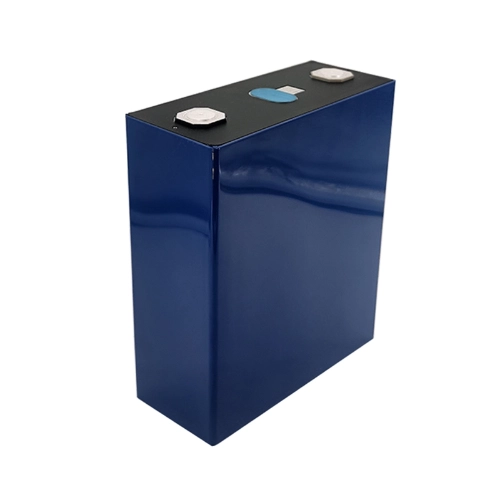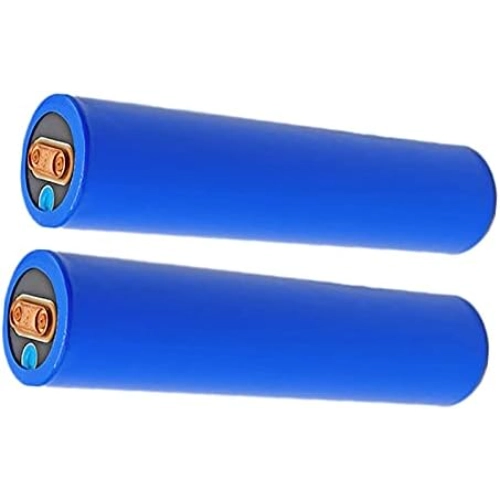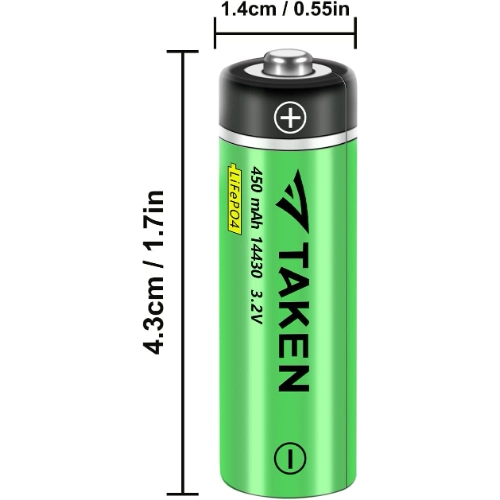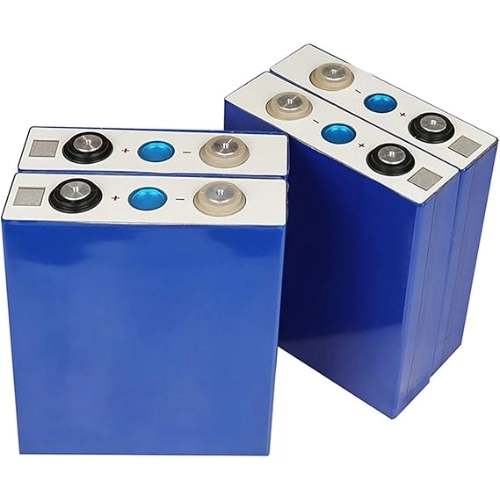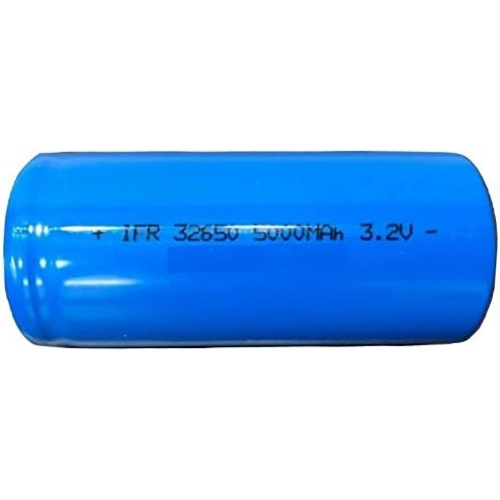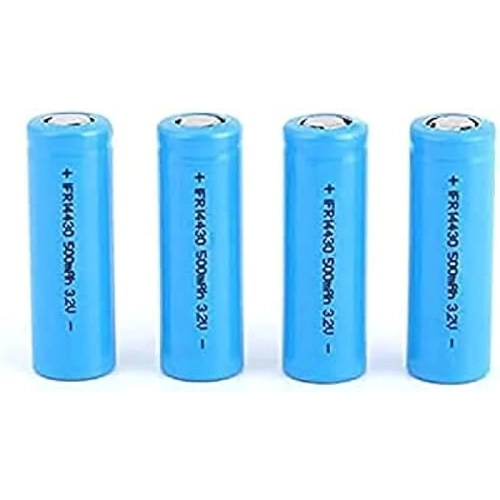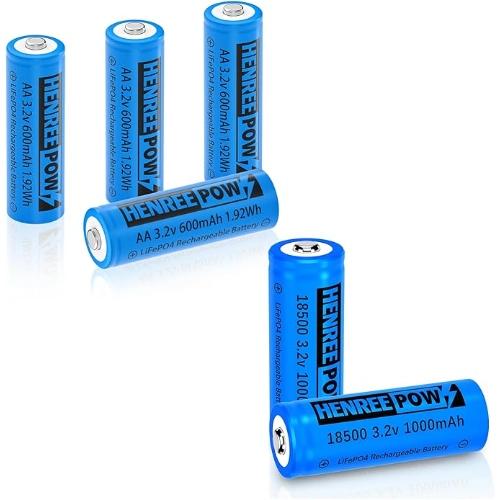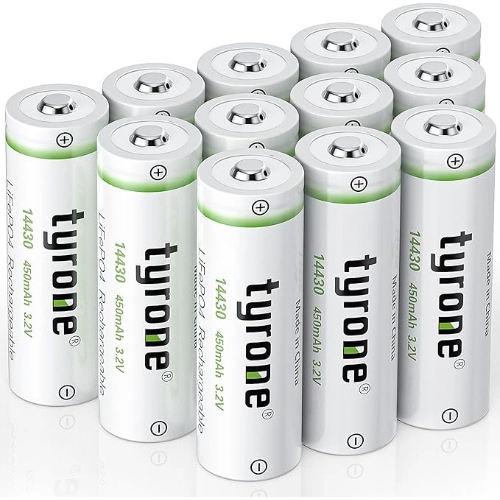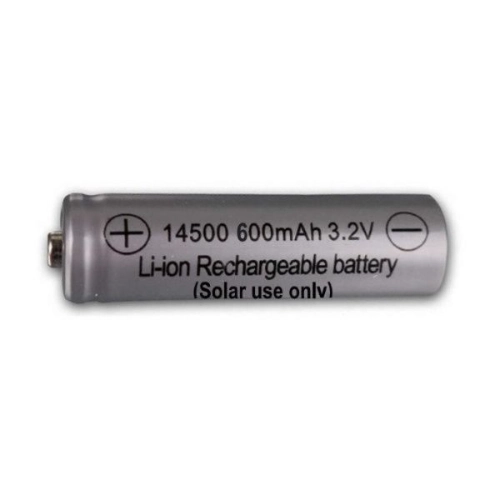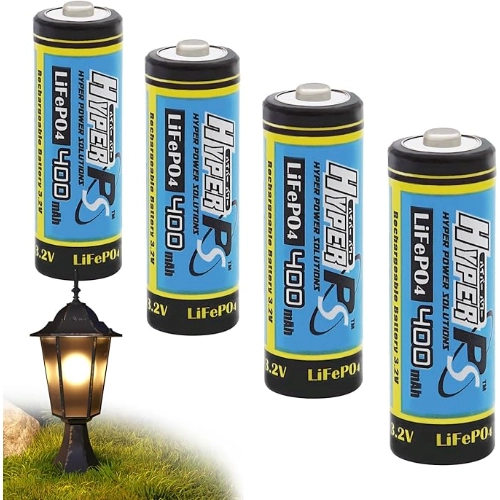When powering solar energy systems, picking the correct battery can make or break your setup. Hence, choosing a battery specifically designed to work in renewable energy systems like solar panels is best. With its stable performance, the 3.2V battery has become a go-to for anyone looking to store solar energy efficiently.
Let’s learn more about 3.2 V about solar batteries!
Part 1. What are 3.2V solar batteries?
3.2V solar batteries are typically Lithium Iron Phosphate (LiFePO4), which is known for its long-lasting performance and excellent safety profile.
How do they differ from other battery types? They stand out due to their unique voltage range and ability to maintain stable output for solar-powered systems.
What is the role of 3.2V batteries in solar energy systems? 3.2V batteries can better handle the fluctuations in energy production that come with solar power.
Part 2. Top 10 3.2V solar batteries: in-depth reviews
1. Ufine 3.2 V 295Ah Prismatic LFP Battery
Specifications:
- Configuration: 1S1P (Single Series, Single Parallel)
- Weight: Approx. 5523g
- Capacity: 295Ah
- Voltage: 3.2V
- Energy: 944Wh
Pros:
- 295Ah ensures long usage periods.
- Operates in various environmental conditions.
- Supports quick charge cycles.
- Up to 2000 cycles with minimal degradation.
- Safe and sustainable chemistry.
Cons:
- Relatively heavy at approximately 5523g.
- Specific to certain applications and setups.
Ideal Applications:
- Tablets
- Emergency lighting
- Home energy storage
- Power tools
- Wheelchairs
2. Bailoda Rechargeable Batteries GTF 3.2V
Specifications:
- Voltage: 3.2V
- Capacity: 15Ah (15000mAh)
- Composition: LiFePO4
- Unit Count: 6 pieces
- Compact, rechargeable design
Pros:
- Long battery life, even with low discharge
- High energy density for consistent performance
- Lightweight and portable for easy transport
- Reliable protection against leakage and damage
- Rechargeable with an extended working life
Cons:
- It may require a compatible charger
- Higher upfront cost compared to non-rechargeable options
Ideal Applications:
- electric bicycles
- electric scooters
- solar lights
- e-bikes
3. Taken 3.2V 450mAh LiFePO4 Rechargeable Battery
Specifications:
- Voltage: 3.2V
- Capacity: 450mAh
- Battery type: LiFePO4
- Cycle life: Over 1200 charges
- Size: 4/5AA, shorter than standard AA batteries
Pros:
- High cycle life with over 1200 recharges
- An environmentally friendly alternative to disposable batteries
- Compact size for specific devices
- Works with a wide range of electronics
- Reliable performance for solar and home devices
Cons:
- Not compatible with standard AA battery replacements
- Lower capacity than larger LiFePO4 batteries
Ideal Applications:
- solar garden lights
- digital cameras
- home security systems
- electric toothbrushes
- mobile mouse or keyboard
4. Multinn 3.2V Deep Cycle DIY Lithium Iron Phosphate Battery
Specifications:
- Voltage: 3.2V
- Capacity: 100Ah
- Lifespan: 2000 to 8000 charge cycles
- Battery type: LiFePO4
- Amperage: 100A
Pros:
- Long lifespan, up to 15 years
- Matched and balanced cells for reliable performance
- Suitable for heavy-duty applications
- High capacity for extended energy storage
- Excellent durability under frequent charging
Cons:
- It may require advanced solar controllers
- Higher initial cost
Ideal Applications:
- rv
- solar energy systems
- electric cars
- scooters
- power tools
5. Power Portable 3.2 Volt 32650 LiFePO4 Battery
Specifications:
- Voltage: 3.2V
- Capacity: 5000mAh
- Chemistry: Lithium Phosphate (LiFePO4)
- Max discharge current: 15A
- Dimensions: 67 mm length, 32 mm diameter
Pros:
- High energy density for longer run times
- No memory effect, extending battery life
- Lightweight and compact for easy use
- Supports up to 2000 charge cycles
- Excellent for high-discharge devices
Cons:
- Sold as a single unit
- It may require specific charging equipment
Ideal Applications:
- rc racing cars
- airsoft guns
- RC robots
- custom battery packs
- e-bikes
6. RUJUE 3.2V LiFePo4 Rechargeable Battery
Specifications:
- Voltage: 3.2V
- Capacity: 500mAh
- Battery type: Lithium Phosphate (LiFePO4)
- Dimensions: 14 x 43 mm
- Cycle life: 1000 cycles (2-3 years of usage)
Pros:
- Environmentally friendly; ideal for solar lights
- Long-lasting, with up to 1000 charge cycles
- Reliable for outdoor applications
- Safe, tested under strict quality standards
- Lightweight and compact design
Cons:
- It may not be compatible with all devices
- Requires specific size (14430), which differs from AA
Ideal Applications:
- Solar panel outdoor garden lights
- Toothbrushes and shavers
- Flashlights
7. Henreepow 3.2V Battery
Specifications:
- Voltage: 3.2V
- Capacity: 1000mAh
- Battery type: Lithium Phosphate (LiFePO4)
- Size: 18500 (2 inches x 0.7 inches)
- Rechargeable up to 1500 cycles
Pros:
- Ideal for solar lights and outdoor use
- Long-lasting with low self-discharge
- Environmentally friendly, no harmful metals
- Safe to use, with reliable performance
- Pre-charged to 30% for transport safety
Cons:
- Needs full charge before initial use
- It may not be compatible with devices needing other battery sizes
Ideal Applications:
- Outdoor garden solar lights
- Landscape and security lighting
- Flashlights and other AA battery-compatible devices
8. Tyrone 3.2V Rechargeable Solar Battery
Specifications:
- Voltage: 3.2V
- Capacity: 450mAh
- Battery type: LiFePO4
- Size: 14430 (Shorter than AA)
- Rechargeable up to 1500 cycles
Pros:
- Versatile use for solar lights, flashlights, and high-drain devices
- Environmentally friendly, reducing waste from non-rechargeable batteries
- Long-lasting with a high recharge cycle count
- Efficient performance in various electronic devices
- 90-day free warranty with 24-hour customer support
Cons:
- Not compatible with AA or AAA battery slots
- Shorter in length compared to AA-size batteries
Ideal Applications:
- Outdoor garden and solar panel lights
- High-drain devices like LED flashlights
- Electric toothbrushes and similar electronics
9. Buya Battery 3.2V Lithium-Ion Solar Light Battery
Specifications:
- Size: AA
- Voltage: 3.2V
- Chemistry: NiMH
- Capacity: 600mAh
- Pack Size: 1
Pros:
- Ideal for specific solar light systems.
- Provides extended power with 600mAh.
- Reduces waste by allowing multiple recharges.
- Convenient for devices designed for AA batteries.
- Affordable price for the performance.
Cons:
- Not suitable for standard 1.2V AA devices.
- Specifically designed for solar lights and similar applications.
Ideal Applications:
- Perfect for solar garden and landscape lighting.
- Suitable for various outdoor illumination devices.
10. HyperPS 3.2V LiFePO4 14430 Rechargeable Battery
Specifications:
- Battery Type: LiFePO4 (Lithium Iron Phosphate)
- Capacity: 400mAh
- Nominal Voltage: 3.2V
- Dimensions: 14 x 43mm (1.69 x 0.55 inches, H x Dia.)
- Weight: 14.9 g per battery
Pros:
- Ensures a steady power supply.
- Easy to fit into various devices.
- It can be recharged multiple times, reducing waste.
- LiFePO4 provides enhanced safety and stability.
Cons:
- Not AA-compatible
- Limited capacity
- Ideal Applications:
- Solar panel
- Flashlights
Part 3. Key factors to consider when choosing a 3.2 V solar battery
The following are the factors to consider when choosing a 3.2 V solar battery:
- Battery capacity: A more significant capacity means more backup power during cloudy days. You’ll want to match this with your energy needs.
- Cycle Life: Check the battery’s capacity for charge and discharge cycles. A higher cycle life means a longer-lasting battery.
- Efficiency: The efficiency of charging and discharging is critical. Higher efficiency leads to more power being used.
- Safety features: Ensure they have built-in protections against overcharging.
Part 3. FAQs
-
Can I use a 3.7V battery instead of a 3.2V in solar lights?
No, you can’t. While the voltage difference may seem small, it can influence the performance of your solar lights. -
What is the difference between a 1.2V and a 3.2V battery?
The primary difference is voltage. A 1.2V battery is typically found in older, low-power applications, while 3.2V batteries are used in modern setups like solar systems. -
What is the voltage range of a 3.2V LiFePO4 battery?
A 3.2V LiFePO4 battery operates within a voltage range of about 2.5V to 3.65V. -
How do you charge a 3.2V LiFePO4 battery?
Charging these batteries requires a compatible charger designed for LiFePO4 chemistry. -
What is the use of a 3.2 V LiFePO4 battery?
A 3.2 V LiFePO4 battery is commonly used in solar energy storage systems. It provides stable and efficient energy storage.
Related Tags:
More Articles
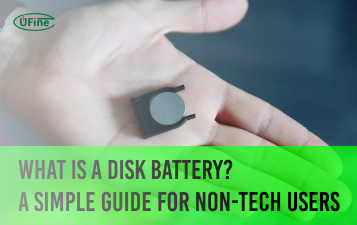
What Is a Disk Battery? A Simple Guide for Non-Tech Users
A disk battery is a small, round cell used in watches, remotes, and other electronic devices. It delivers steady power for compact, low-drain devices.
What Battery Powers a Space Heater?
Discover the type of battery that powers space heaters and learn how to choose the right one for efficient heating in your home or office.
What Is an LR14 Battery? Learn About This C-Size Cell
The LR14 battery, also known as a C battery, delivers steady power. Learn its specs, uses, lifespan, and how it compares to other battery types.
Watch Battery Dimensions Chart: Sizes, Voltages, and Equivalents Explained
Understanding watch battery dimensions helps you choose the right size, voltage, and equivalent model to keep your watch running safely and smoothly.
How Long Can You Rely on Battery-Powered Generators?
Discover battery generator runtime & lifespan factors. Learn how to maximize performance and choose the right power solution.
